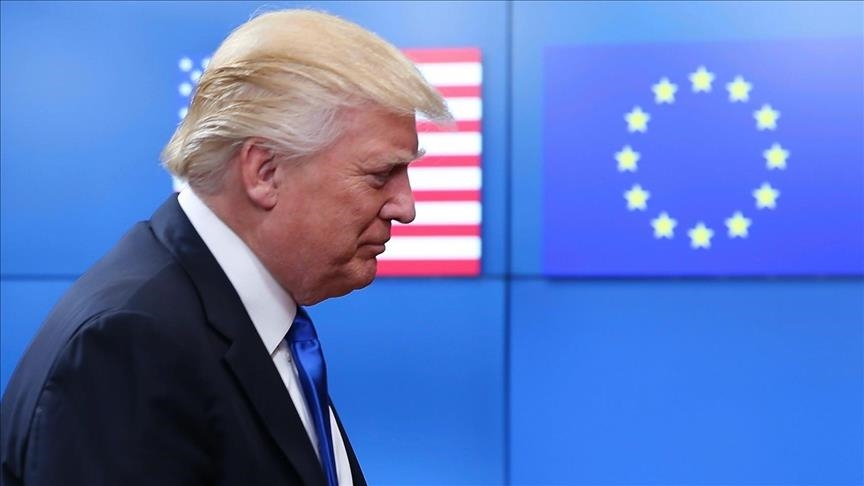

By Anadolu Agency
ATHENS
Donald Trump’s imminent second term as US president represents the “biggest test” ever faced by the EU, which must act decisively to avoid the “the danger of continued and increasing irrelevance for Europe,” experts caution.
The Trump administration is coming in at a time when Europe has a “very weak hand to play,” both operationally and politically, as it lacks “political leadership by the big countries of the EU,” according to Dimitris Tsarouhas, an associate professor of international relations at Virginia Tech University.
He believes Europe has missed out on years of opportunities to prepare itself, particularly failing “to join forces with one another.”
“Europe has failed to supranationalize defense procurement policies. It has failed to supranationalize the decision-making process for so long that it now finds itself at a competitive disadvantage with other major powers – China and the US in technology, and Russia and the US in conventional, and even asymmetrical, warfare,” he said.
On Trump’s push for European NATO members to ramp up defense spending, Tsarouhas believes the billionaire Republican is justified in his demand but will not exert as much pressure as his first term, particularly since many countries have raised their budgets due to fear of Russia.
“What is more problematic is the idea that the bond between the US and Europe is now going to become much more loose, and it’s going to be based solely on a transactionalist approach, instead of values-based cooperation that wants to make sure both sides feel they benefit from the relationship,” he said.
Though the Indo-Pacific region is gaining prominence as an area of focus for US political and military leaders, Tsarouhas dismissed fears that this shift signals US abandonment of Europe.
“The real point is the danger of continued and increasing irrelevance for Europe in a world that it cannot control any longer,” he said.
“The EU, which was created by ideological liberalism and benefited from a liberal set of rules for long, finds it hard to remain relevant in an extremely challenging and growingly illiberal international system.”
This struggle extends beyond external dynamics, as internal problems such as the rise of far-right, anti-establishment parties also test Europe’s cohesion, making Trump’s return an even bigger challenge, he added.
“It will constitute the biggest test of the EU’s capacity to act we have ever seen in its 70-year history,” Tsarouhas said.
“Whatever happens with the Trump administration, whatever happens in the big theater of war with Russia, or with China, Europe is going to be tested like it was tested never before.”
‘Europeans cannot expect solutions from US’
George Tzogopoulos, a senior expert on global politics at the European Council on Foreign Relations, agreed that Trump’s demands for higher European defense spending are justified.
“To some degree, I consider his policy a catalyst for Europe to build its own defense,” Tzogopoulos told Anadolu.
“If Europe proceeds, then President Trump will have no reason to challenge the general American commitment to European security. The ball is in the court of European members of NATO, and they can make a choice.”
For Europe, he emphasized, the most feasible response to Trump’s demands is increasing financial contributions to NATO, which is critical for the continent’s security.
“This can be the basis for transatlantic relations in the next four years,” he added.
Tzogopoulos also highlighted the broader implications of the perceived US decline, manifested in its withdrawal from global agreements and failure to foster peace in the Middle East.
“Europeans cannot necessarily expect solutions from the US, and this goes beyond the impact of President Trump on world affairs,” he said.
The US increasingly views China as a rival and hopes for Europe to have the same approach, added Tzogopoulos, warning that this could go against European interests.
“China is becoming a critical geopolitical and economic actor, and remains a partner and crucial interlocutor to Russia,” he said.
“The stronger Europe, and the EU specifically, becomes, the easier it will be to express disagreement with the US in some areas and on some issues.”
On how the EU should approach its transatlantic relationship under Trump, Tzogopoulos emphasized the importance of avoiding a trade war while preparing for tough negotiations.
“I consider a second Trump presidency an opportunity the EU should not miss,” he said.
“It is imperative for the EU Commission to support European industries, perhaps by developing a European version of the Inflation Reduction Act, and to practically implement the ‘strategic autonomy’ concept.”
We use cookies on our website to give you a better experience, improve performance, and for analytics. For more information, please see our Cookie Policy By clicking “Accept” you agree to our use of cookies.
Read More